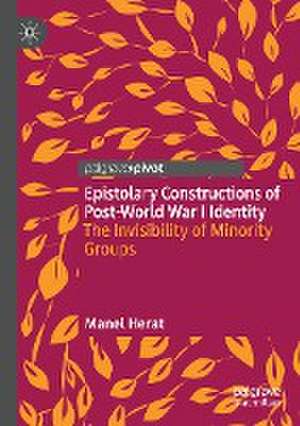Epistolary Constructions of Post-World War I Identity: The Invisibility of Minority Groups
Autor Manel Heraten Limba Engleză Paperback – 3 dec 2022
| Toate formatele și edițiile | Preț | Express |
|---|---|---|
| Paperback (1) | 360.80 lei 3-5 săpt. | +13.93 lei 6-12 zile |
| Springer International Publishing – 3 dec 2022 | 360.80 lei 3-5 săpt. | +13.93 lei 6-12 zile |
| Hardback (1) | 454.16 lei 6-8 săpt. | |
| Springer International Publishing – 2 dec 2021 | 454.16 lei 6-8 săpt. |
Preț: 360.80 lei
Preț vechi: 434.70 lei
-17% Nou
Puncte Express: 541
Preț estimativ în valută:
69.04€ • 73.83$ • 57.56£
69.04€ • 73.83$ • 57.56£
Carte disponibilă
Livrare economică 27 martie-10 aprilie
Livrare express 12-18 martie pentru 23.92 lei
Preluare comenzi: 021 569.72.76
Specificații
ISBN-13: 9783030878917
ISBN-10: 3030878910
Pagini: 178
Ilustrații: XVI, 178 p. 10 illus., 1 illus. in color.
Dimensiuni: 148 x 210 x 21 mm
Greutate: 0.26 kg
Ediția:1st ed. 2021
Editura: Springer International Publishing
Colecția Palgrave Pivot
Locul publicării:Cham, Switzerland
ISBN-10: 3030878910
Pagini: 178
Ilustrații: XVI, 178 p. 10 illus., 1 illus. in color.
Dimensiuni: 148 x 210 x 21 mm
Greutate: 0.26 kg
Ediția:1st ed. 2021
Editura: Springer International Publishing
Colecția Palgrave Pivot
Locul publicării:Cham, Switzerland
Cuprins
Chapter 1: Introduction.- Chapter 2: Compiling the corpus.- Chapter 3: The letter: Metacommunicative features in colonial correspondence .- Chapter 4: Post-war letters to the Lord Mayor of Liverpool: Epistolary constructions of identity.- Chapter 5: Historical learning disabilities: linguistic abilities of ex-servicemen with imbecility, feeblemindedness and mental deficiency in the Ministry of Pension files.- Chapter 6: Psychological disability, word use and identity: language in ex-servicemen’s letters to the Ministry of Pensions.- Chapter 7: Keywords in the DSM manuals: an analysis of psychological disorders of warfare.- Chapter 8: Europe through Indian Eyes: constructions of foreignness in Indian soldiers’ letters.- Chapter 9: Conclusion.
Notă biografică
Manel Herat is Senior Lecturer in the Department of English at Liverpool Hope University, UK.
Textul de pe ultima copertă
"Within the cultural imagination, soldiers in action are so often elevated to a superhuman, heroic status. Owing to bigoted attitudes towards disability and ethnicity, however, the very same people can be made to feel subhuman if and when they are lucky enough to return to regular life. Dr Herat explores this terrible dynamic with a particular focus on World War I. Her analysis of personal letters, which have become important historical documents, reveals much about a devastating shift from the frontline of battle to the margins of society."
--Professor David Bolt, Director Centre for Culture and Disability Studies
"Epistolary constructions of post World War I identity makes an entirely original contribution to the literature of soldier subjectivity in the First World War. Through linguistic analysis it sheds new light on the experiences of marginalized communities whose own voices too often are overlooked in historical discussion."
--Jessica Meyer, Associate Professor of Modern British History, University of Leeds, UK.
--Professor David Bolt, Director Centre for Culture and Disability Studies
"Epistolary constructions of post World War I identity makes an entirely original contribution to the literature of soldier subjectivity in the First World War. Through linguistic analysis it sheds new light on the experiences of marginalized communities whose own voices too often are overlooked in historical discussion."
--Jessica Meyer, Associate Professor of Modern British History, University of Leeds, UK.
Manel Herat is Senior Lecturer in the Department of English at Liverpool Hope University, UK.
Caracteristici
Examines letters written by minority ethnic groups largely overlooked in the mainstream literature Analyses the construction of different identities through letter-writing in both personal and public spheres Explores connections between language, race, identity and disability
